A passionate and persuasive call for reform of an unfair law
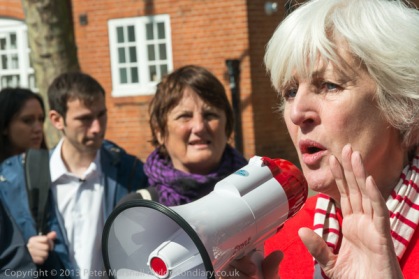
Jengba’s Gloria Morrison. Source: MyLondonDiary.com
Every month a group of women gather in a back room at a community centre on a council estate in south London. The children running about and the Brazilian drumming band next door don’t pay much attention to them, but someone is listening.
And it’s not just anyone. Powerful members of parliament are sitting up and paying attention to what they are saying. Through sheer determination and hard work, the women have managed to put reform of the joint enterprise law firmly on the political agenda.
We explained in an article last week what the law is and why it’s so controversial.
Oh Gloria!
One of the driving forces behind the campaign to change the law is Gloria Morrison, an organiser of charity Joint Enterprise: Not Guilty by Association (Jengba). Ms Morrison is not a lady to be under-estimated.She is a savvy working-class woman with short white hair and steely blue eyes. Her resolve and fortitude – along with that of many others – led to the Justice Select Committee calling on Justice Minister Chris Grayling to change the law.
The MPs said joint enterprise was being used as a dragnet to haul in young men from ethnic minorities. However, Mr Grayling has put off any change until after the election.
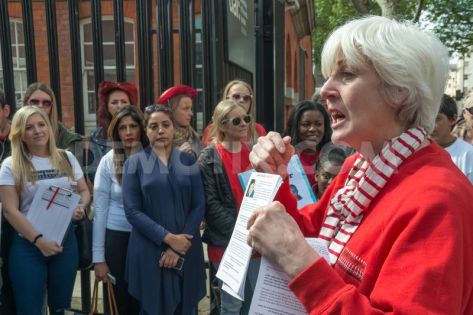
Gloria Morrison of Jengba. Source: MyLondonDiary
Converted to the cause
But even Ms Morrison was not always convinced that change was needed. She was inspired to get involved by the case of Kenneth Alexander, a black teenager who was sentenced to 16 years in prison even though he was semi-conscious on the floor during a fight and didn’t participate in an attack that ended in murder.“When this happened to Ken, I was a completely different woman to the woman I am now. I was totally sleep-walking,” said Ms Morrison. “I thought we had a really good justice system and that if you went to prison for murder, you must have committed a murder….Now I believe there are thousands of people in prison who shouldn’t be there.”Ms Morrison set up London Against Injustice, but when she met Jan Cunliffe, a mother whose near-blind son was convicted of murder under joint enterprise, they joined forces with two others to form Jengba to speak out on the issue together.
“Joint enterprise doesn’t give justice to the victims, it just makes more victims by putting people into a living death in prison,” said Ms Morrison. “You put people in prison for 30 to 35 years, they’re going to come out dead. They’re not going to come out sane.”
Let the numbers speak for themselves
Jengba began to gather data on the unjust nature of the law. The real breakthrough came when the Bureau of Investigative Journalism did a report on joint enterprise using some of this data.The report showed that between 2005 and 2013, at least 1,800 people and up to 4,590 have been prosecuted for homicide using joint enterprise. This represents almost one-fifth of homicide prosecutions in that period.
Another key bit of research was done by Cambridge University. Researchers interviewed 298 prisoners and found that 50 per cent were joint enterprise cases and 37 per cent of cases involved black people.
“It absolutely vindicated what I knew – that this law discriminates. There are lots and lots of young men in the prison system who shouldn’t be there,” said Ms Morrison.
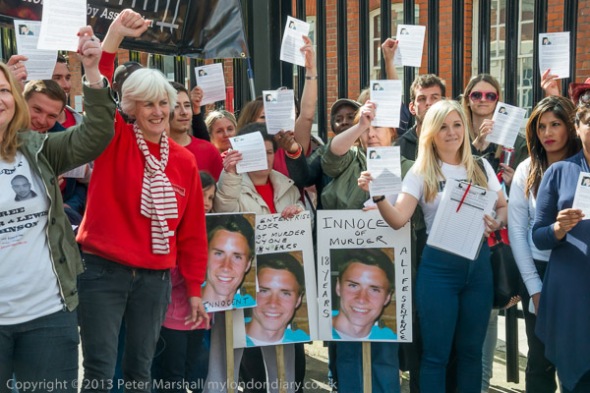
Gloria Morrison and Jengba campaigners. Source: MyLondonDiary
Whose fault is it?
Ms Morrison doesn’t blame Mr Grayling for not changing the law as his hands were tied before the upcoming general election, but that doesn’t mean she is a big fan either.“Grayling has done so many bad things that he is even vilified by members of his own party,” said Ms Morrison. “I can’t understand how this man thinks to stop prisoners having books is a good idea. It’s just so draconian.”But it is not just Mr Grayling. She thinks the whole system stinks.
“I think the UK has one of the most vindictive justice systems in the world. It’s just throw away the key,” she says. “And these black kids on estates, just lock them up because they’re only going to end up in prison anyway. They mean they are more valuable in the prison system than they are out in society.”
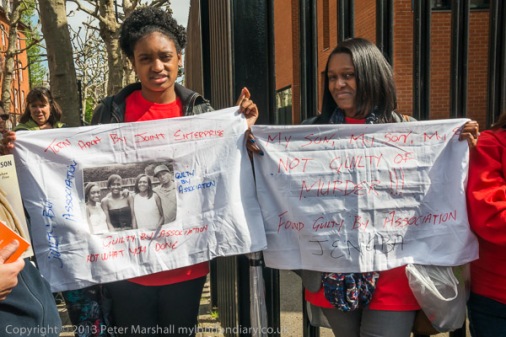
Jengba campaigners. Source: MyLondonDiary
The rich get justice and the poor get the law
Ms Morrison argues that the law is not applied evenly. It incarcerates a disproportionate number of young black men, but it doesn’t seem to apply to other crimes that could be classed as joint enterprise such as those of bankers, members of Parliament (think expenses) or even the police themselves.She uses the case of a man who died after being assaulted by a police officer at a protest.
“Why are the police who stood around and watched Ian Tomlinson get battered to death – why aren’t they being prosecuted under joint enterprise? It’s one law for them and one law for us,” she says. “The rich get justice and the poor get the law. That’s a Methodist saying and it’s absolutely true about joint enterprise.”She also points out the rank hypocrisy of celebrating the 800-year anniversary of the Magna Carta when innocent people are being imprisoned under an unjust law.
“Magna Carta doesn’t exist,” she said. “It’s not worth the paper it’s written on, especially if you’ve got things like joint enterprise.”
Ms Morrison argues that the burden of proof has switched from the prosecution to the defence. She cites the case of one man who was in prison with two weeks left to serve when he was linked to a crime his brother allegedly committed. The spurious link was a mobile phone call he had made from inside prison using a phone he should not have had.
“The burden of proof is gone. That is the cornerstone of any civilised society,” says Ms Morrison. “The burden of proof must be that the prosecution prove what people do. It’s gone. It doesn’t exist anymore.”
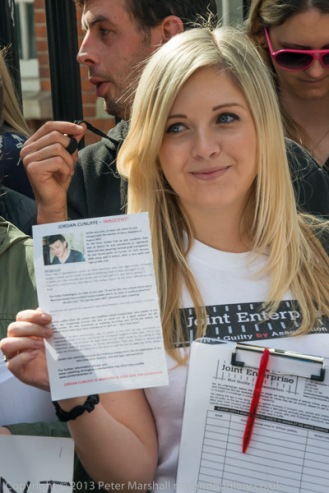
Charlotte Henry of Jengba campaigning to free her brother Alex. Source: MyLondonDiary
And just when you think it couldn’t get worse…
Ms Morrison is especially scathing about London Mayor Boris Johnson’s new Operation Shield, which allows collective punishment of ‘gangs’. She calls the law “abhorrent”. She is working with human rights lawyers Doughty Street to see what can be done to stop it.“It goes completely against the Justice Select Committee. They just came out in our favour saying the doctrine is causing serious miscarriages of justice and is in need of urgent reform. Then one week later, Boris does this,” says Ms Morrison. “It’s political policing….he’s standing for MP, so he wants to show he’s tough on crime.”
Ms Morrison dares the British ruling class to go even further. If they are in favour of laws such as those used in Operation Shield, then she suggests they go all the way back to the past.
“Put us all back into serfdom. Put us all back into tithes,” she says. “Make everyone part of a tithe of ten and then if one of them commits a crime, they can all be shipped off because that is exactly what this is.”One thing is for certain. This tenacious woman will not stop fighting. The next stop is Downing Street to deliver a petition to the prime minister on 17 March 2015.
(Source: https://prisonwatchuk.wordpress.com/2015/02/27/interview-jengbas-gloria-morrison-speaks-about-unjust-joint-enterprise-law/)

